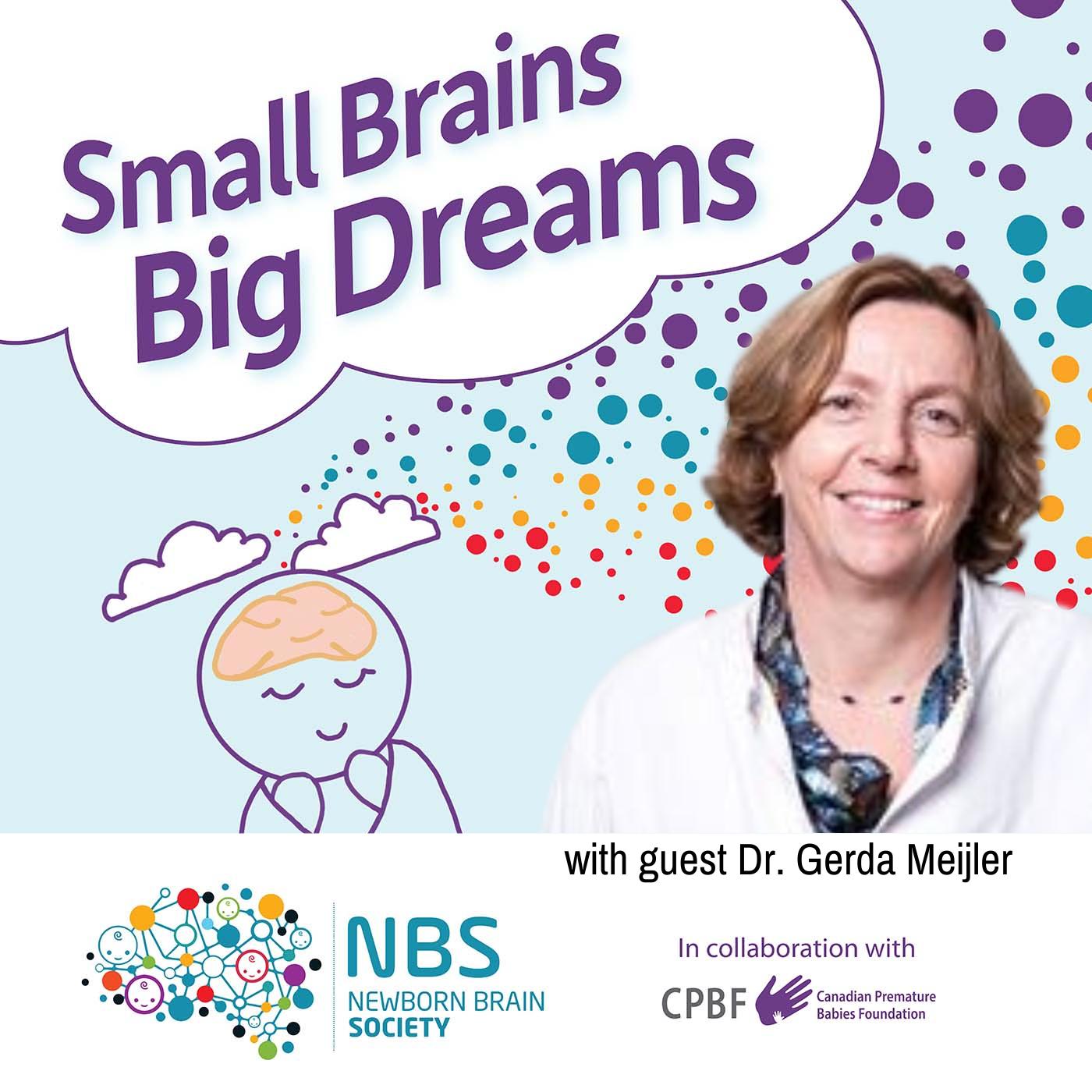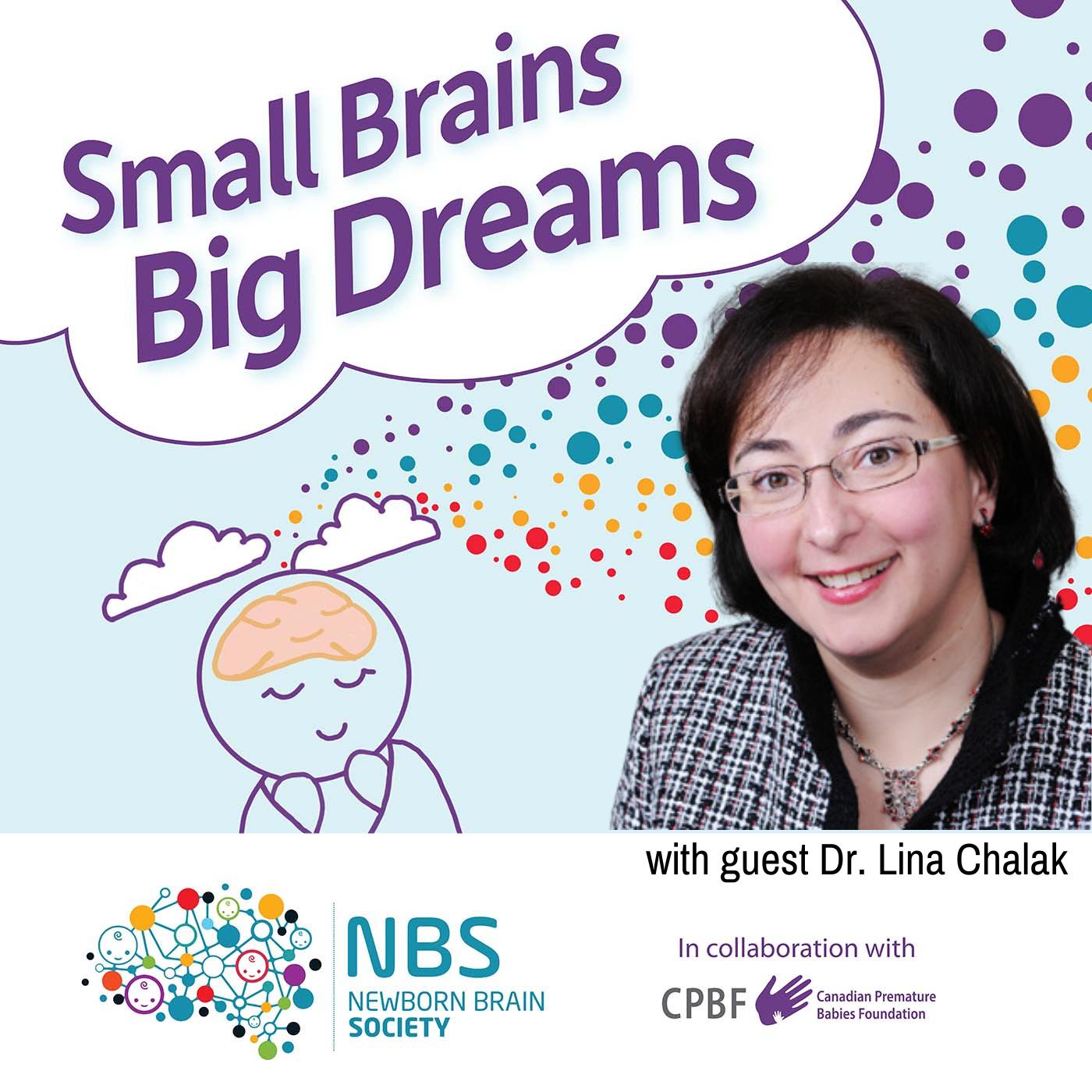Discover Small Brains, Big Dreams
Small Brains, Big Dreams

Small Brains, Big Dreams
Author: Newborn Brain Society & Canadian Premature Babies Foundation
Subscribed: 4Played: 5Subscribe
Share
© Copyright 2025 Small Brains, Big Dreams
Description
Leading researchers and clinicians in the field of neurology reflect on the role of mentorship in Small Brains, Big Dreams, a podcast series created by Newborn Brain Society, in partnership with the Canadian Premature Babies Foundation.
The Newborn Brain Society is a non-profit organization supporting a world in which all newborns have access to and receive the optimal brain care. We promote international, multi-disciplinary collaboration, education, and innovation among clinicians, scientists, and parents. Small Brains, Big Dreams is hosted by preemie parent & journalist, Jenna Morton.
Connect with us at newbornbrainsociety.org, on Facebook @NewbornBrainSociety, and on Twitter @ NewbornBrains.
The Newborn Brain Society is a non-profit organization supporting a world in which all newborns have access to and receive the optimal brain care. We promote international, multi-disciplinary collaboration, education, and innovation among clinicians, scientists, and parents. Small Brains, Big Dreams is hosted by preemie parent & journalist, Jenna Morton.
Connect with us at newbornbrainsociety.org, on Facebook @NewbornBrainSociety, and on Twitter @ NewbornBrains.
8 Episodes
Reverse
Drawing on eight decades of learning. Dr. Mark Scher shares his thoughts on the importance of staying curious, acknowledging and understanding disparity, and the power of an interdisciplinary approach. Dr. Mark Scher studied fetal/neonatal neurology (FNN) at the University of Rochester, followed by four years at SUNY/Downstate Medical School. He completed his pediatrics residency at Cornell/New York Hospital Pediatrics, followed by a neurology/pediatric neurology/neurophysiology fellowship at the University of Minnesota and neonatal neurology research at Stanford University. His career included time at the University of Pittsburgh, Magee-Women’s Hospital and the Children’s Hospital of Pittsburgh, and as Division Chief of Pediatric Neurology at Rainbow Babies and Children’s Hospital in Ohio, establishing a second FNN program at the University Hospitals of Cleveland. Dr. Scher was a tenured full professor of Pediatric and Neurology at Case Western Reserve University, transitioning to Emeritus Scholar and Professor in 2020. Dr. Scher is known for national and international research collaborations and organizational work, including with the Newborn Brain Society. He’s authored more than 190 peer-reviewed publications (with several more currently under review) as well as 46 book chapters. Small Brains, Big Dreams is a podcast created by the Newborn Brain Society, in partnership with the Canadian Premature Babies Foundation, and hosted by preemie parent & journalist, Jenna Morton.The Newborn Brain Society is a non-profit organization supporting a world in which all newborns have access to and receive the optimal brain care. We promote international, multi-disciplinary collaboration, education, and innovation among clinicians, scientists, and parents.Connect with us at newbornbrainsociety.org, on Facebook @NewbornBrainSociety, and on Twitter @NewbornBrains.If you've enjoyed this episode, please rate, share & subscribe.
The daughter of two physicians, Dr. Gerda Meijler knew from a young age she would also pursue a career in medicine. She began her studies in pediatrics, then shifted to focus on neonatology after experiencing the premature birth of her twins. Decades of students have learned the art of cranial ultrasound under the guidance of Dr. Meijler, who is also a prolific author who values cross-discipline learning.Dr. Gerda Meijler MD, PhD recently retired from the Isala Women and Children’s Hospital, Zwolle, the Netherlands, where she maintains a research appointment. She has worked in Toronto, Canada, and Leiden and Amsterdam, Netherlands. Dr. Meijler, in collaboration with Dr. Linda de Vries and Dr. Frances Cowan, has presented the annual Cranial Ultrasound Courses at London’s Imperial College of Medicine for more than twenty years. She’s an active member of the Educational Committee of the Newborn Brain Society (NBS) and responsible for some of the teaching modalities on the NBS website. She is the author of Neonatal Brain Injury: An Illustrated Guide for Clinicians Counselling Parents and Caregivers being published in August 2024.For more on Dr. Meijler:https://www.barnesandnoble.com/w/neonatal-brain-injury-gerda-meijler/1144820227Small Brains, Big Dreams is a podcast created by the Newborn Brain Society, in partnership with the Canadian Premature Babies Foundation, and hosted by preemie parent & journalist, Jenna Morton.The Newborn Brain Society is a non-profit organization supporting a world in which all newborns have access to and receive the optimal brain care. We promote international, multi-disciplinary collaboration, education, and innovation among clinicians, scientists, and parents.Connect with us at newbornbrainsociety.org, on Facebook @NewbornBrainSociety, and on Twitter @NewbornBrains.If you've enjoyed this episode, please rate, share & subscribe.
There’s a clear theme in the life and work of Dr. Khorshid Mohammad: no challenge is too large to face. Known for his innovation as both a scientist and as an educator, Dr. Mohammad is quick to share how others impacted his approach to life and learning and what he hopes others will take from those experiences. Dr. Khorshid Mohammad (MD, MSc, FABP, FRCP (Edin)) is a Staff Neonatologist at Alberta Health Services, Professor of Pediatrics at the University of Calgary’s Cumming School of Medicine, Medical Site lead of Neonatology at Alberta Children’s Hospital, and Medical Director of Southern Alberta Transport Service. He’s a founding member of the Sonographic Clinical Assessment of the Newborn (SCAN) program and the Newborn Brain Society. A graduate of the University of Damascus and Arab League with Master and Specialty degrees in Pediatrics, Dr. Mohammad trained in Neonatal Neurology and Targeted Neonatal Echocardiography at the Universities of British Columbia and Calgary, and completed his neonatal fellowship training at the University of Calgary, where he established the Neonatal Neuro-Critical Care program. Dr. Mohammad was recognized with an Emerging Leader Award in Neonatology by the Canadian Pediatric Society for his quality improvement work that led to significant reduction in mortality and brain injury in infants who suffered from asphyxia and seizure.For more on Dr. Mohammad:https://newbornbrainsociety.org/team-member/khorshid-mohammad-md-msc-fabp-frcp-edin/Small Brains, Big Dreams is a podcast created by the Newborn Brain Society, in partnership with the Canadian Premature Babies Foundation, and hosted by preemie parent & journalist, Jenna Morton.The Newborn Brain Society is a non-profit organization supporting a world in which all newborns have access to and receive the optimal brain care. We promote international, multi-disciplinary collaboration, education, and innovation among clinicians, scientists, and parents.Connect with us at newbornbrainsociety.org, on Facebook @NewbornBrainSociety, and on Twitter @NewbornBrains.If you've enjoyed this episode, please rate, share & subscribe.
Season Two of Small Brains, Big Dreams continues our conversations around mentorship with leading neurologists from around the world. Dr. Lina Chalak has many accomplishments and accolades in her biography, but she’s quick to point out the award from UT Southwestern celebrating her work as a mentor holds a special place of honor for her. Listen as she shares her ‘why’ and encourages you to do the same.Dr. Lina Chalak (MD, MSCS) is the founding director of both the Neurointensive Care program and the Fetal Neonatal Neurology Fellowship Program at UT Southwestern, where she holds the William Buchanan Chair in Pediatrics and serves as the Interim Chief of Neonatal-perinatal Medicine. She is a Professor in the Departments of Pediatrics and Psychiatry at UT Southwestern Medical Center and an active researcher.Dr. Chalak is board certified in general pediatrics, general pediatrics recertification, neonatal-perinatal medicine, and neonatal-perinatal recertification. She earned her medical degree and completed a residency in pediatrics at American University of Beirut, then fellowships in both neonatal-perinatal medicine and pediatrics at UT Southwestern/Children’s Health Dallas. In 2011, she received a Master of Clinical Science Distinction from UT Southwestern’s Graduate School of Biomedical Sciences, and in 2021 she earned the school’s Best Mentor Award.Dr. Chalak’s research focuses on asphyxia, hypothermia, and neonatal brain injury. She led the PRIME mild asphyxia collaborative study and pioneered a Neurovascular bundle for a critical real time evaluation of the coupling of cerebral blood flow and neuronal activity in newborns with asphyxia.For more on Dr. Chalak:https://newbornbrainsociety.org/team-member/lina-f-chalak-md-mscs/Small Brains, Big Dreams is a podcast created by the Newborn Brain Society, in partnership with the Canadian Premature Babies Foundation, and hosted by preemie parent & journalist, Jenna Morton.The Newborn Brain Society is a non-profit organization supporting a world in which all newborns have access to and receive the optimal brain care. We promote international, multi-disciplinary collaboration, education, and innovation among clinicians, scientists, and parents.Connect with us at newbornbrainsociety.org, on Facebook @NewbornBrainSociety, and on Twitter @NewbornBrains.If you've enjoyed this episode, please rate, share & subscribe.
Professor Emeritus Dr. Linda de Vries has watched the field of pediatric neurology grow from the early use of ultrasounds to cutting edge hypothermic procedures. She predicts an increasing use of AI matched with a holistic view of medicine, guided by the mentorship of many in the field.
A little bit of luck and a lot of work. Both are needed to create a mentorship that works for both parties. Dr. Terrie Inder shares her tried and tested methods for building a mentor-mentee relationship, and her ‘three P’ approach to a rewarding career.
Dr. Donna Ferriero has been described as a pioneer in neonatal neurology and neonatal neuroscience. Our first series guest, Dr. Steven Miller, says working with her was inspirational and greatly impacted his approach to medicine and to mentorship. Hear from Dr. Ferriero herself in Episode 2 of Small Brains, Big Dreams.
In our first episode, Dr. Steven Miller speaks to the difference between supervision and mentorship, the power of interdisciplinary research, and the importance of authentic engagement of families within the research process.








